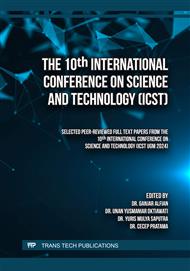p.765
p.771
p.783
p.796
p.802
p.814
p.825
p.845
p.854
Knowledge Management Analytic Dashboard for Supporting COVID-19 Mitigation in Indonesia
Abstract:
The COVID-19 pandemic has posed unprecedented challenges worldwide, requiring efficient and effective knowledge management strategies to aid in mitigation efforts. This paper introduced the Knowledge Management Analytic Dashboard (K-MAD) to support decision-makers, healthcare professionals, and policymakers in combating the spread of COVID-19. K-MAD leverages data analytics, and knowledge representation techniques to aggregate, analyze, and visualize diverse information sources related to the pandemic. The proposed dashboard provides real-time updates on the number of initiatives, project catalog, initiatives model, problem-based approach, and the methods, enabling stakeholders to make data-driven decisions promptly. K-MAD incorporates sophisticated data integration mechanisms to gather data from various sources, including government reports, public health agencies, research papers, and social media, ensuring comprehensive coverage and accuracy. The dashboard has a user-friendly interface caters to users with varying levels of technical expertise, promoting accessibility and usability. Customizable visualizations and interactive elements empower users to explore data from different angles and obtain valuable insights quickly. The paper concludes with a validation study, demonstrating K-MAD's efficacy in supporting decision making processes during the pandemic. Knowledge Management Analytic Dashboard presented in this paper offers a powerful and comprehensive tool to support COVID-19 mitigation efforts.
Info:
Periodical:
Pages:
845-853
DOI:
Citation:
Online since:
October 2025
Authors:
Keywords:
Price:
Сopyright:
© 2025 Trans Tech Publications Ltd. All Rights Reserved
Share:
Citation:


